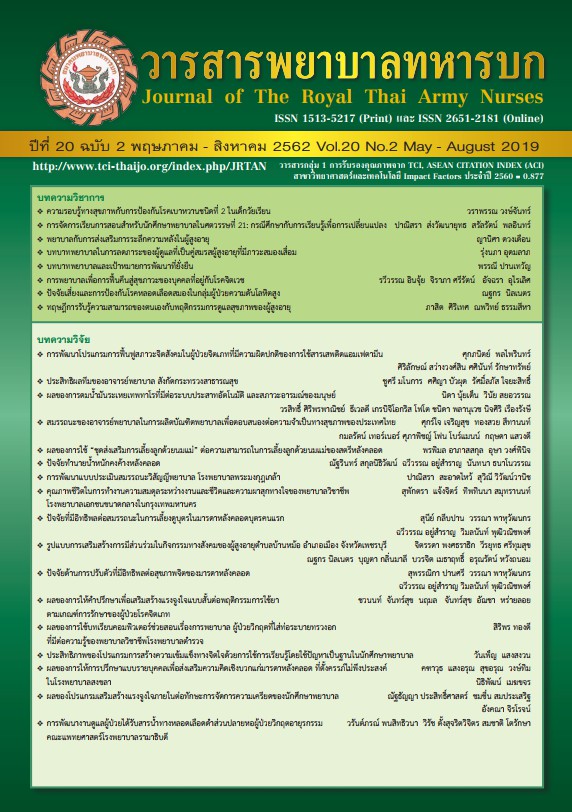The Effects of Brief Intervention on Medication Adherence Behaviors of Schizophrenic Patients
Keywords:
brief intervention, medication adherence behaviors, schizophrenia patientsAbstract
This study was a quasi-experimental research. The objective of research were to compared the medication adherence behaviors of schizophrenic patients, before and after received the brief intervention ; and between the groups that were received the brief intervention with the groups received routine nursing care. The samples were selected by the purposive sampling technique to include the schizophrenic patients. They were divided into two groups: 30 patients who were provided with a nursing care as the control group , and the other 30 patients who received brief intervention as the experimental group by simple random sampling and matching the sample group in terms of gender, age and education level. The intervention instruments was the brief intervention. Data were collected using the questionnaires of medication adherence behaviors. Data were analyzed by frequency, percentage and t-test. The results of this study showed that: The experimental group’s mean score of the medication adherence behaviors were significantly higher than before involving the brief intervention ; and significantly higher than control group at the level .05 (p<.01).
Downloads
References
2. Mental Health Strategy and Planning Division, Department of Mental Health. Statistics of schizophrenic patients, fiscal year 2010 -2012. Department of Mental Health; 2013. (in Thai)
3. Department of Mental Health. Report of the number of outpatients of psychiatric hospitals under the Department of Mental Health in 2017. Nonthaburi: Ministry of Public Health; 2017. (in Thai)
4. Krithong N, Upsen R. The effect of educative and supportive program on Self-care Behaviors of schizophrenic patients with negative symptoms in community. Journal of The Royal Thai Army Nurses. 2017; 18: 357-364. (in Thai)
5. Tay SE. Compliance therapy: An intervention to improve inpatients’ attitudes toward Treatment. Journal of Psychosocial Nursing.2007; 45: 29-37.
6. McDonald JL & Badger TA. Social Function of persons with schizophrenia. Journal psychosocial Nursing. 2002; 40: 42-50.
7. Suriyaphant N, Sotiwiwichanwong A. Motivation to prevent repeated illnesses Schizophrenic patients. Nonthaburi: Srithanya Hospital; 2008. (in Thai)
8. Prajanket O. The effect of counseling using motivational interviewing on adherence to antiretroviral therapy. [dissertation]. Bangkok: Mahidol University; 2008. (in Thai)
9. Planning and Information Group, Nakhon Sawan Rajanagarindra Psychaiatric Hospital. Patient Statistics Report Psychiatry. Nakhon Sawan: Planning and Information Group, Nakhon Sawan Rajanagarindra Psychaiatric Hospital; 2017. (in Thai)
10. Dejkhong T, Tantachanya P, Phromduang S, Thadsri W. The Effects of Brief Intervention in the lack of psychiatric patients Psychiatric ward Surin Hospital. Surin: Surin Hospital; 2011. (in Thai)
11. Uthaphan R. The effect of group motivational interviewing on medication compliance of schizophrenic patients in community. [dissertation]. Bangkok: Chulalongkorn University; 2012. (in Thai)
12. Miller WR, Rollnick S. Motivational Interviewing in the Treatment of Psychological Problems. New York: The Guilford press; 2007.
13. Prochaska JO, Diclmente CC. Insearch of how people change: applications to addictive behaviors, in Additive behaviors: Reading on Etiology, Prevention, and Treatment. Edited by Marlatt GA, VadenBos GR. Washington DC: American Psychological Association Press; 1998.
14. Kuntubtim J. The effect of family motivational intervention on medication adherence of persons with schizophrenia in community. [dissertation]. Bangkok: Chulalongkorn University; 2015. (in Thai)
Downloads
Published
How to Cite
Issue
Section
License
บทความหรือข้อคิดเห็นใดใดที่ปรากฏในวารสารพยาบาลทหารบกเป็นวรรณกรรมของผู้เขียน ซึ่งบรรณาธิการหรือสมาคมพยาบาลทหารบก ไม่จำเป็นต้องเห็นด้วย
บทความที่ได้รับการตีพิมพ์เป็นลิขสิทธิ์ของวารสารพยาบาลทหารบก
The ideas and opinions expressed in the Journal of The Royal Thai Army Nurses are those of the authors and not necessarily those
of the editor or Royal Thai Army Nurses Association.






